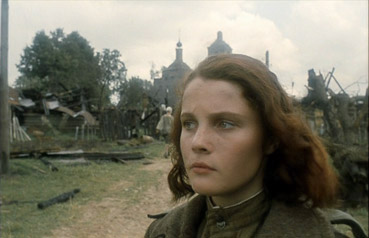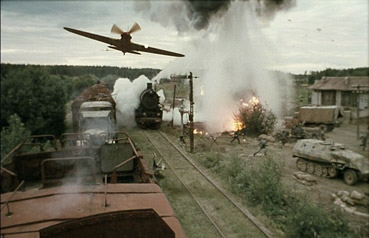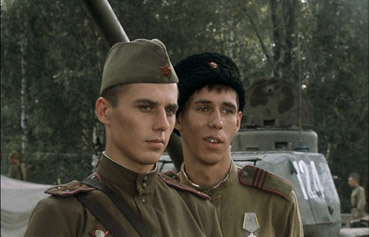|
There's something curiously old-fashioned about The Star [Zvezda], a 2002 Russian film adaptation of the similarly titled short story by poet, playwright and author Emmanuil Kazakevich. Much of it has a familiar ring, from the generically popular setup – the Soviet army scouting company that embarks on a fateful mission behind enemy lines during WW2 has a string of precedents in American and British cinema – to the diverse collection of stock war movie characters that make up the group. There's squad leader Lieutenant Travkin (Igor Petrenko), whose decency commands the respect of his men and whose good looks bewitch pretty new camp radio operator Katya (Ekaterina Vulichenko), who turns later radio messages to the squad into love letters to her new beau. There's cocksure Paddy Considine lookalike Sgt. Kostya Mamochkin (Aleksey Panin), a perennially cheerful optimist who takes risks as much for the fun of it as for tactical gain. New to the group, meanwhile, are the steadfast Sergeant Brazhnikov (Yuri Laguta), spiritual Sino-Russian sharpshooter Private Temdekov (Amadu Mamadakov), self-confident local boy Private Bykov (Anatoli Gushchin), and apprehensive young greenhorn Private Vorobyov (Artyom Semakin), whose nervousness quickly earns him the nickname Sparrow. None of which is an issue. One of the principal pleasures of company-based war films is that they bring together people who would probably never meet and cooperate in peace time. And The Star scores rather well here, making each of its main characters distinctive enough to avoid the sort of confusion that made the crop-haired and facially similar platoon in the 2005 9th Company so tricky to tell apart.

What did catch me by surprise for a ten-year-old film is the sometimes classical cinematography – deep focus shots in which single characters are framed in close-up against expansive backgrounds and look off past the camera with expressions of curiosity or contemplation – and a tendency to crudely over-dramatize moments of extreme danger and emotion. Chief culprit here is Aleksei Rybnikov's old-school orchestral score, which while generally impressive it goes all Igor Stravinsky on us in moments of peril (I'm thinking specifically of that piece from The Rite of Spring the so influenced John Williams' now-iconic score for Jaws) and practically weeps onto the screen when tragedy looms. This is sometimes hammered home by Lidiya Milioti and Eduard Yermolin's editing, which triple-jump-cuts to a German observer when the group's movements are spotted and over-emphasises the subsequent threat by sharply cross-cutting between the low-key tension music that accompanies the fleeing Russians and a full-blooded here-comes-the-shark theme for the advancing Germans, one that shouts "Bad men approaching!" at an unnecessary volume.
With the characters no more than sketched by the start of the mission, full emotional engagement is initially in short supply, and the film relies instead on us identifying with the soldiers' plight and the history-taught probable consequences of their discovery by enemy forces. This does still result in some effectively tense scenes, the best of which bring individual group members face-to-face with enemy soldiers, and in one case forces them to grapple desperately (and realistically) for their lives in the battlefield mud. Somewhat inevitably, this becomes part of Sparrow's journey from boy to man, as his apprehension about killing is repeatedly tested until he is forced to take a life, an experience that leaves him emotionally damaged.
Drawing sometimes clear influence from war films of the past from both sides of the former iron curtain, the film makes a few stylistic and tonal gear shifts even within a single scene. When Bykov and Sparrow find themselves trapped in the back of German transport vehicle, for example, Bykov's restricted view of the countryside is subtly employed to remind him of the rape of his homeland, something really brought home when the hanging bodies of two executed locals drift into his line of sight. It's hardly surprising that the tension is ramped up when two enemy soldiers hitch a lift in the back of the vehicle, but the manner in which the stowaways are discovered is handled with surprising poetry, then suddenly interrupted by a conveniently timed bombing raid, one so pyrotechnically spectacular (recalling the signature bombing sequence from Elem Kilimov's WW2 classic Come and See) that it all but dissipates the initial air of deus ex machina.

Elsewhere, director Nikolay Lebedev walks generically familiar turf with a sometimes conflicting blend of youthful energy and nostalgia for old-school hero building, the odd burst of flash-frame cutting and a snoricam included to intermittently remind us that we're watching a product of modern rather than WW2-era Russian cinema. It all builds to a cornered-in-a-barn climax that will ring a bell with western and war movie buffs alike, a last-ditch stand by a heroic band of brothers whose emotional impact is almost scuppered by the spectacular sentimentality of the Travkin-Katya connection.
As a whole I'm not sure how I feel about The Star. The squad members themselves are an engaging bunch, but my empathy would have been greater if we'd spent a little more time with them before being asked to care for their fate. Their adventures behind enemy lines are also a sometimes perplexing mix of positive and negative elements, with grippingly handled confrontation, engaging performances and breathtaking pyrotechnics undercut a little by stylistic borrowings, situational recycling and some shameless cinematic melodramatics. Involving and impressively handled at best, it's undermined by a nagging sense of cinematic déjà-vu and a director who may well have been born out of his time.
As if determined to reflect the film's sometimes classical approach to framing, the 1.55:1 (an odd ratio for a 2002 film) transfer here is letterboxed rather than anamorphically enhanced, resulting in a reduced resolution that at times detrimentally affects the clarity of fine detail. This is not helped by what looks like an NTSC to PAL standards conversion, which while generally solid does put a few jaggies on diagonal lines, which are particularly visible if the picture is paused on a large TV. On the plus side, the image is clean and bright and the contrast range well balanced, and the muted and earth-toned colour palette – a now common method of evoking a period feel – is consistent throughout. If this were an anamorphic PAL transfer, it would probably look terrific.

The 5.1 surround soundtrack is altogether more impressive, a splendidly mixed and inclusive track with clean reproduction of dialogue and effects and precise use of the surrounds, at their liveliest when the squad are in engaged in battle, with bullets and gunshots raining from every direction and explosions displaying an impressive bass kick.
Not a thing. Bit of a shame, as I'd rather like to have heard the director's angle on the material and his approach and influences.
You won't have to look far to confirm that The Star has many enthusiastic supporters, and I'm certainly not going to be so arrogant as to suggest that they are in any way misguided – my problems with the film are very much my own, though they are ones that some others are likely to share. But the pleasures are definitely there and for many will be worth tolerating the borrowings and dramatic overstatement to get to. Chelsea Films' DVD is quite possibly a victim of the transfer as purchased. Despite its strong points, the non-anamorphic picture is a little disappointing, and the lack of extra features is also a shame. Great soundtrack, though.
|